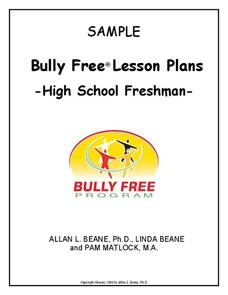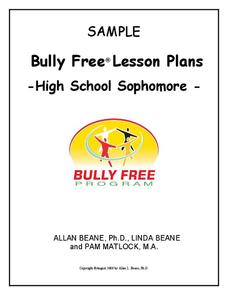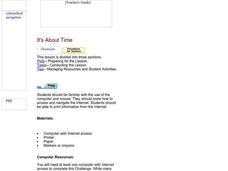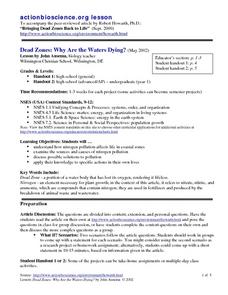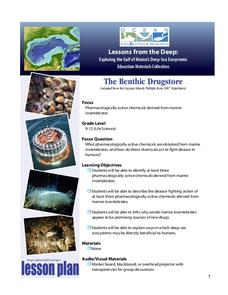Curated OER
Good Timing
Pupils investigate time, how people measure it, and how it influences our lives. They complete an online Webquest, analyze various calendars, answer discussion questions, and identify references to time in a newspaper article.
NASA
Photons in the Radiative Zone: Which Way Is Out? An A-Maz-ing Model
Can you move like a photon? Young scholars use a maze to reproduce the straight line motion of a photon. The second in a six-part series of lessons on the sun has learners measure angle of incidence and refraction to determine the path...
Bully Free Systems
Bully Free Lesson Plans—11th Grade
It takes courage to stand up to bullies. Two sample lessons from a complete Bully Free curriculum, "Courageous and Brave Bystanders" and "Assertiveness Skills for Bullied Students and Empowered Bystanders" provide participants with...
Bully Free Systems
Bully Free Lesson Plans—12th Grade
Two sample lessons from a curriculum unit on bullying provide high school seniors with an opportunity to assess their online and cell phone behavior and to consider how they can offer support to bullied students. Each plan includes an...
Bully Free Systems
Bully Free Lesson Plans—Ninth Grade
"Bullying and Prejudice" and "Do You Cyber Bully," two lessons from a complete Bully Free program, serve as samples of the approach used in a unit designed to bring awareness to and to combat bullying. Each lesson asks class members to...
Bully Free Systems
Bully Free Lesson Plans—10th Grade
Two lessons, "What Does Cyber Bullying Look Like?" and "Factors Influencing My Reporting the Bullying of Others," serve as examples of the 12 included in a Bully Free curriculum. Each plan includes discussion questions, an activity, and...
Curated OER
Spring Time Trees/Flowers
Plan ahead! Integrate science and language arts! Schedule your reading of C.S. Lewis’ The Lion, the Witch, and The Wardrobe to coincide with the arrival of spring. As pupils read Chapter 11 of the Lewis classic, they are assigned one of...
Curated OER
It's About Time: Olympics, Winter Sports, Math, Media, Time Zones
Students use the Internet to determine broadcast times for the Winter Olympic Games snowboarding competitions. In determining these times, they need to consider time zones throughout the world.
Curated OER
What Time Is It?
Fourth graders distinguish between analog and digital clocks and read time from both types. In this clock reading instructional activity, 4th graders discuss the types of clocks and the time zones. Students find times in specific time...
Curated OER
Time and Time Again
Students analyze the effects of time zone differences on how we function as a global community, focusing particularly on the turn of the millennium as a way for students to calculate time zone differences.
Curated OER
The Magic School Bus Goes to Mussel Beach
Students investigate tides and create a model of an intertidal zone. In this hands-on marine science lesson based on a Magic School Bus book, the teacher leads students in a discussion about tides, then helps students model a tide and...
NOAA
Tides
Low tides, high tides, spring tides, neap tides, diurnal tides, semidiurnal tides, mixed tides ... just how many types of tides are there? The 10th installment of a 23-part NOAA Enrichment in Marine sciences and Oceanography (NEMO)...
Curated OER
Physical Education Unit Plan: Soccer - Lesson 10
The concluding lesson in this four-star series is World Cup day! Players come dressed in the colors of the country they are representing for the World Cup tournament. The rules for the mini-games in this tournament are modified to allow...
Curated OER
It's About Time!
Learners examine the potentials, both positive and negative, of adapting an international 'Internet time' system. They create and solve word problems that require them to translate between the current time system and Internet time.
Curated OER
Dead Zones: Why Are the Waters Dying?
Students investigate the effects of pollution on marine ecosystems. They read and discuss an article, identify the effects of pollution on marine life, conduct research on local nutrient pollution, and conduct local water quality studies.
Bully Free Systems
Bully Free Lesson Plans—Seventh Grade
Having a hard time defining bullying with your seventh graders? Discuss the different types of behavior one would see in a bullying situation with a series of lessons, worksheets, and group activities.
Bully Free Systems
Bully Free Lesson Plans—Eighth Grade
Middle schoolers are likely very familiar with the concept of bullying and cliques. Discuss their experiences and brainstorm ways to handle peer conflict and feelings of exclusion with a poem that focuses on bullying, and a second lesson...
Visa
Hall of Fame Lesson Module — Financial Football
Kick off an engaging review on personal finance with an online football game. Financial Football incorporates both football strategies and economic knowledge in an interactive format, allowing future CFOs to answer a variety of questions...
Curated OER
Zones of the Rocky Intertidal Zones
Sixth graders predict intertidal zones for organisms. In this intertidal zones lesson, 6th graders analyze an illustration of an organism and a class diagram of the intertidal zones. Students research to locate the zone the organism is...
Curated OER
Entering The Twilight Zone
In this lesson sixth grade students get into groups and research a given ocean habitat. The major features of cold-seep communities are the objective but plenty information is given about other habitats which could be assigned to...
Curated OER
Climatic Zones
Third graders recognize and locate Frigid, Temperate, and Torrid climatic zones on the word map or globe. They explain that plants, animals, and human societies display adaptations to the climates they live in .
Curated OER
Time Zone
Eighth graders are given a year in history to research and identify the social and cultural situations at the time. In groups, they examine and describe various styles and periods of art and present them to the class. They relate the...
Curated OER
Globe Lesson 12: Global Time
Students explore the concept of global time. In this geography skills activity, students use standard meridians and the hour scale on globes to determine global time as they respond to questions in this self-directed activity.
NOAA
Importance of Deep-Sea Ecosystems – The Benthic Drugstore
You never know what you will find next in the deep sea ecosystem. So far, scientists have found items that work as anti-tumor agents, anti-inflammatory agents, agents that stop uncontrolled cell division, and much more. The lesson begins...






